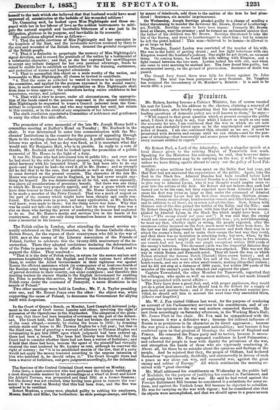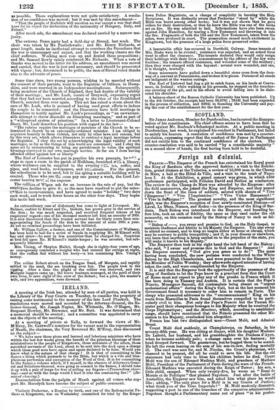Cdr Vraniurto.
Mr. Baines, having become a Cabinet Minister, has of course vacated' his seat for Leeds. In his address to the electors, claiming a renewal of their confidence, after briefly remarking that his sentiments on " all tho leading questions of domestic policy are well known to them," ho says—
"With regard to that great question which at present occupies the publia mind, I think it my duty to say, that while I lament as much as any man the necessity for war, I am convinced that the war in which we are now engaged was absolutely forced upon us by the unprincipled and aggressive policy of Russia. I am also convinced that, situated as we are, it must be prosecuted with decision and energy until we can obtain—and for the pur- pose of obtaining—that honourable and secure peace which the country is on every account entitled to expect."
Sir Robert Peel, a Lord of the Admiralty, made a singular speech at a local dinner given to the retiring Mayor of Tamworth last week. Speaking for the Ministers his colleagues, he said, that however deter- mined the Government may be in carrying on the war, it will be useless unless we have fitting agents abroad to carry out the policy of Lord Pal- merston.
Eight or nine millions had been spent on the Baltic fleet last year, yet that fleet had not answered the expectations of the public. Again, take the
fleet in the Black Sea. Admiral Dundee had been recalled before Lord Palmerston came into office. Admiral Dundee is a brave man ; but he had to give way to Admiral Lyons, who it was thought would inspire more vi- gour into the actions of the fleet. Sir Robert did not believe that such had turned out to be the case, but they expected more from Admiral Lyons be- cause his fleet was twice as large as that under the command of Admiral Dandies. Admiral Lyons had six first-class steam-ships, thirteen steam- frigates, twenty steam-sloops, besides mortar-vessels and other kinds of boats and in addition to all these, six or seven sail-of-the-line. Now, Nelson with thirteen soil-of-the-line gained the battles of the Baltic and the Nile ; and Sir Robert thought they would agree with him that all had not been accom- plished by Admiral Lyons in the Black Sea which might have been. (A Voice—" The enemy would not come out.") It was said that the enemy would not come out, and that might be perfectly true ; yet, notwithstanding, he must say that, whether right or wrong, the people expected, after the enormous outlay incurred on the fleet, much more would have been done. In the last war the sailing-vessels had to manwuvre and work their way in to attack the enemy's forts, and to make their escape the best way they could, and then there was no hesitation in attacking forts ; but nowt when, by the aid of steam, a vessel might get beyond the reach of harm in five minutes, our vessels had not been (with one single exception) within 2000 yards of the enemy's batteries. Two thousand yards was the respectful distance they kept, and it was at this range that Sweaborg was attacked. This was not the
i
way in which Nelson and Exmouth acted. They all knew the way in which Nelson attacked the famous Dutch [Danish] three-crown battery ; and at ,Algiers Lord Exmouth went in with five sail of the line, five frigates, four bomb-vessels, and one or two other small vessels, making altogether sixteen ; and he did not stop at a distance. of 2000 yards, but within 200 yards of the muzzles of the enemy's guns he attacked and captured the place. Captain Townshend, the other Member for Tamworth, regretted that his colleague, who spoke so well on most matters, had not made himself better acquainted with naval affairs—
The Navy have done a great deal, and, with proper appliances, they would yet do a great deal more ; and he should look to Sir Robert for a supply of gun-boats and mortar-boats ; and if there was not a sufficient number pro- vided, he should call him to account the next time they assembled there. (Cheers and laughter.)
Mr. W. J. Fox visited Oldham last week, for the purpose of rendering an a000unt of his Parliamentary services to his constituents, and of ex-
pressing his opinions on the war and matters connected therewith. He met them accordingly on Saturday afternoon, in the Working Men's Hall; Mr. James Platt in the chair. Mr. Fox said he sympathized with the
war, because it was a defensive war ; because the indirect influence of Russia is as pernicious in its character as its direct aggression ; because the war gives a chance to the oppressed nationalities; and because it has conferred upon us that greatest of blessings the alliance of England and France. He censured the Peace party end its tactics, because it encou- raged the enemy. Mr. Fox expressed confidence in Lord Palmerston ; and exhorted the people to bear with dignity the privations of the war, and strengthen the hands of those who are vigorously conducting it. Above all, let there be no mistake about the opinions and feelings of the people. And he rejoiced that they, the people of Oldham, had declared themselves "spontaneously, decidedly, and unreservedly in favour of such a peace as war alone can win, and successful war, against the great enemy and robber of Europe." All which sentiments the meeting re- ceived with "great cheering."
Mr. Miall addressed his constituents on Wednesday in the public ball of Rochdale, for the purpose of justifying his conduct in Parliament, and of explaining his views on the war. He said ho had voted against the Foreign Enlistment Bill because he considered it a substitute for army re- form, and against the Turkish Loan Bill because he objected to subsidies. He was for carrying on the war with vigour ; but he considered also that its objects were accomplished, and that we should agree to a peace as soon as possible. These explanations were not quite satisfactory. A resolu- tion of no-confidence was moved ; but it was met by this amendment-
" That the people of Rochdale will sanction no war except a war that shall have for its object the declaration of the nationality of Hungary, Italy, and Poland."
After much ado, the amendment was declared carried by a narrow ma- jority.
The extreme Peace party had a field-day at Stroud, last week. The chair was taken by Mr. Postlethwaite ; and Mr. Henry Richards, at great length, made an ineffectual attempt to convince the Stroudians that the war is unnecessary and unjust, and that the working classes are the chief sufferers. Working men rose up and denied these propositions ; and Mr. Samuel Bowly vainly reinforced Mr. Richards. When a vote of thanks was moved to the latter for his address, an amendment was moved and carried, that the war is just and necessary, and should be prosecuted with vigour ; but, determined to be polite, the men of Stroud voted thanks also to the advocate of peace.
Some time since, two young persons, wishing to be married without the consent of their parents, went to the Registrar of Odiham in Hamp- shire, and were married in an Independent meetinghouse. Subsequently, being members of the Church of England, they had doubts of the validity of their marriage ; and Mr. Lush, curate of Greywell, expressing regret that they had not been married according to the rites of the Established Church, married them over again. This act has raised a storm about the ears of Mr. Lush, who is accused of having used great efforts to induce the couple to be remarried ; and the Dissenters have held meetings in Hampshire to testify against Mr. Lush's proceedings, as "an unwarrant- able attempt to throw discredit on Dissenting marriages," and as part of a " widespread system of priestism." In a letter to Lieutenant-Colonel Short, Mr. Lush describes his position with regard to the law-
" The rubrics require the marriages of members of the Church to be so- lemnized in church by an episcopally-ordained minister. I am obliged to acquiesce heartily in these rubrics, not only by other laws and canons, but .by this very act, which allows Dissenters to contract a legal marriage before the Registrar. I obey the act by acknowledging the legal validity of such marriages, as far as the things of this world are concerned ; and I obey the same act by endeavouring to bring my parishioners to value the spiritual blessings conveyed in our own marriage service. So far am I from having offended either against law or liberty."
The Earl of Leicester has put in practice his own precepts, by i-^". steps to open a room in the parish of Holkham, furnished a library, where workmen can be supplied in the evening .,71;fs. tea, coffee, and pipes, and read books, newspapers, and Pr..;:odicals. For the present, the schoolroom is to be used, but in the spring a suitable building will be erected. Those who use thz, room pay one penny a week, the Lord Lei- cester bearing mrs,,t. o: the expense.
The cpiti.crs of Wigan ask for an increase in the rate of pay, but the employers decline to give it ; so the men have resolved to put the mine- twliers to inconvenience, and have agreed to make "holiday" two days each week, and to work fewer hours on the other four days. They began this tactic last week.
An extraordinary case of dishonesty has come to light at Liverpool. Mr. Bulmer, cashier to Ewart and Co., brokers, has grown grey in the service of the firm ; he was much respected, and received frequent tokens of his employers' regard—one of his deceased masters left him an annuity of 2001. It is now discovered that this trusted servant has for thirty years been mis- appropriating the funds of the firm to the amount of some 3001. a year. As yet no criminal proceedings have been initiated.
Mr. William Callow, a farmer, and one of the Commissioners of Wallasey, has been held to bail for a series of frauds in supplying Mr. DPKinnel with hay and straw—he sent in less quantities than he charged for. Suspicion at first fell upon Mr. M'Kinnel's stable-keeper ; he was arrested, but sub- sequently liberated.
Mrs. Vining, of Shepton Mallet, though she is eighty-four years of age, so courageously combated a burglar who had entered her cottage at night, that the ruffian fled without his booty—a box containing Mrs. Vining's money.
The collier Robert struck on the Tongue Sand, off Margate, and rapidly settled in the sand, the sea breaking over her. The people took to the rigging. After a time the plight of the collier was observed, and two Margate luggers came up ; the brave boatmen managed, at the peril of their own lives, to save eight of the crew of the Robert; but a pilot, the master's wife, and two apprentices, were drowned.



























 Previous page
Previous page